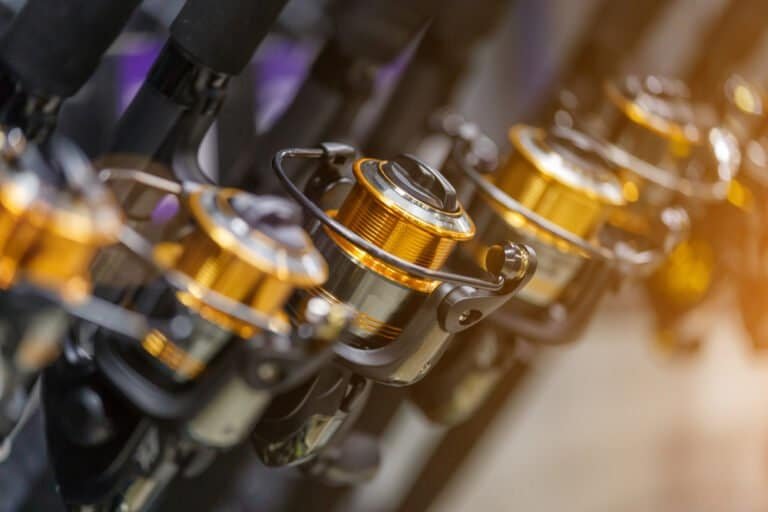Spinning Rod vs Casting Rod: What You Need to Know
Fishing is a beloved pastime enjoyed by millions worldwide. Whether you’re a seasoned angler or just starting, choosing the right fishing rod is crucial. In this blog, we’ll explore the differences between spinning and casting rods, helping you make an informed choice.

Simplicity for Beginners
Spinning rods are perfect for newcomers due to their user-friendly design. These rods feature a fixed reel seat below, making casting and retrieval a breeze. The top-mounted spinning reel eliminates line twists, making it ideal for beginners to grasp basic casting techniques quickly.
Precision for the Experienced
On the other hand, casting rods are favored by experienced anglers seeking accuracy. With a trigger-style reel seat on top, they offer enhanced casting precision. Casting rods excel with heavier lures and lines, making them perfect for targeting big fish like bass or pike.
Sensitivity vs. Power
Consider sensitivity and power when choosing. Spinning rods excel in finesse situations, detecting even subtle nibbles. In contrast, casting rods provide more power and leverage, ideal for battling strong fish or navigating dense cover.
Choose by Technique
Spinning rods shine in finesse situations like delicate presentations with small lures or targeting finicky panfish. Casting rods excel in heavy cover areas or using heavier bait and line setups.
In upcoming sections, we’ll delve into techniques, lures, and maintenance tips and provide top recommendations for both rod types. Whether you’re a beginner or an experienced angler, we’ll help you navigate this exciting sport.
Understanding Spinning vs. Casting Rods
When fishing, your choice of rod can significantly impact your success. Freshwater anglers often face the choice between spinning and casting rods. Let’s break down the differences.
Spinning Rods
These versatile rods are popular for their flexibility and ease of use. They feature a reel beneath the rod, making them great for beginners. Spinning rods are ideal for lightweight lures and techniques.
Casting Rods
Casting rods, with a reel on top, offer precision and control. They handle heavier lures and lines better, making them a favorite among experienced anglers.
Before deciding, think about your specific fishing needs and preferences. Spinning rods are great for lighter lures and a simpler experience while casting rods offer control and power for heavier setups.
Advantages of Spinning Rods in Freshwater
Freshwater anglers love spinning rods for several reasons:
Versatility: Spinning rods can handle various techniques and lures, making them adaptable to different fishing styles.
Sensitivity: These rods have flexible tips that detect even the slightest nibble, which is crucial in clear waters.
Ease of Use: Perfect for beginners, spinning rods are straightforward, making them an ideal choice for those new to fishing.
They provide value for money and are suitable for various applications, from panfish to bass or pike. Their adaptability and ease of use make spinning rods a top choice for freshwater anglers.
When to Choose a Casting Rod
While spinning rods have their merits, casting rods shine in specific scenarios:
Accuracy and Control: Casting rods excel when you need precision and control, such as accurately targeting specific spots or casting.
Handling Heavier Lures: If you plan to use heavier lures or target larger fish species like bass or pike, a casting rod is often the better choice.
Forceful Presentations: Casting rods are perfect for flipping, pitching, or punching through heavy cover, requiring sensitivity and power.
Casting rods provide power, accuracy, and control for specific fishing styles and scenarios, making them the preferred choice.
Key Factors in Rod Selection: Sensitivity, Power, and Action
Choosing the right rod involves considering sensitivity, power, and action:
Sensitivity: It’s about how well the rod transfers vibrations from the line to your hands. Spinning rods tend to be more sensitive due to their design.
Power refers to the rod’s strength and ability to handle different fish sizes and fighting situations. Casting rods offer more power options.
Action: It determines how much the rod bends when pressure is applied. The choice between fast and slow action depends on your fishing style and target species.
Understanding these factors helps you select the right rod based on your preferences and needs. Your choice depends on your target species, fishing location, and techniques.
Rod Length and Weight Considerations
Rod length and weight play essential roles in your fishing experience:
- Longer rods offer greater casting distance, while shorter rods provide better control in tight spaces.
- Longer rods are suitable for casting long distances or targeting larger species, while shorter rods excel in smaller streams or when precision is crucial.
- Rod weight, from ultralight to heavy, affects sensitivity and handling. Choose based on your target species and fishing style.
Consioth length and weight to match your fishing style and target species, ensuring an enjoyable fishing experience.
Beginner-Friendly Choices: Spinning or Casting?
Choosing between spinning and casting rods as a beginner depends on your preferences:
- Spinning rods are forgiving and user-friendly, ideal for those new to fishing. They are versatile and great for casting lighter lures over long distances.
- Casting is rare and precise and is better for heavy lures or techniques like flipping and pitching.
Consider ease of use, versatility, and personal preferences when deciding between the two. Both options have strengths, so choose based on your fishing style.
Techniques and Lures: Best Practices for Each Rod Type
Spinning and casting rods have unique characteristics that suit different techniques:
- Due to their sensitivity and control, spinning rods excel in finesse techniques like drop-shotting, wacky rigging, or finesse jigging.
- Casting rods are perfect for power-oriented techniques, such as flipping jigs into heavy covers or casting heavy lures with precision.
Choose techniques and lures that align with your rod’s strengths, enhancing your fishing experience.
Maintenance and Care Tips for Longevity
Proper maintenance ensures your rod’s longevity:
- Clean your rod after each trip to prevent dirt and debris buildup.
- Inspect for damage, especially in guides.
- Store horizontally to distribute weight evenly.
- Avoid prolonged exposure to harsh sunlight.
- Protect your rod during transportation with a quality case or tube.
By following these tips, you’ll enjoy long-lasting, reliable fishing gear.
Top Freshwater Rod Recommendations
Consider these top recommendations when choosing your freshwater fishing rod:
- Ugly Stik Elite Spinning Rod: Known for its durability and versatility, it is suitable for various techniques.
- Abu Garcia Vendetta Casting Rod: Offers balance, sensitivity, and control, suitable for accurate casting.
- Shakespeare Ugly Stik GX2 Spinning/Casting Combo: Perfect for beginners, it offers both spinning and casting rods in one package.
Choose a rod that matches your preferences, fishing style, and target species for a rewarding fishing experience.






